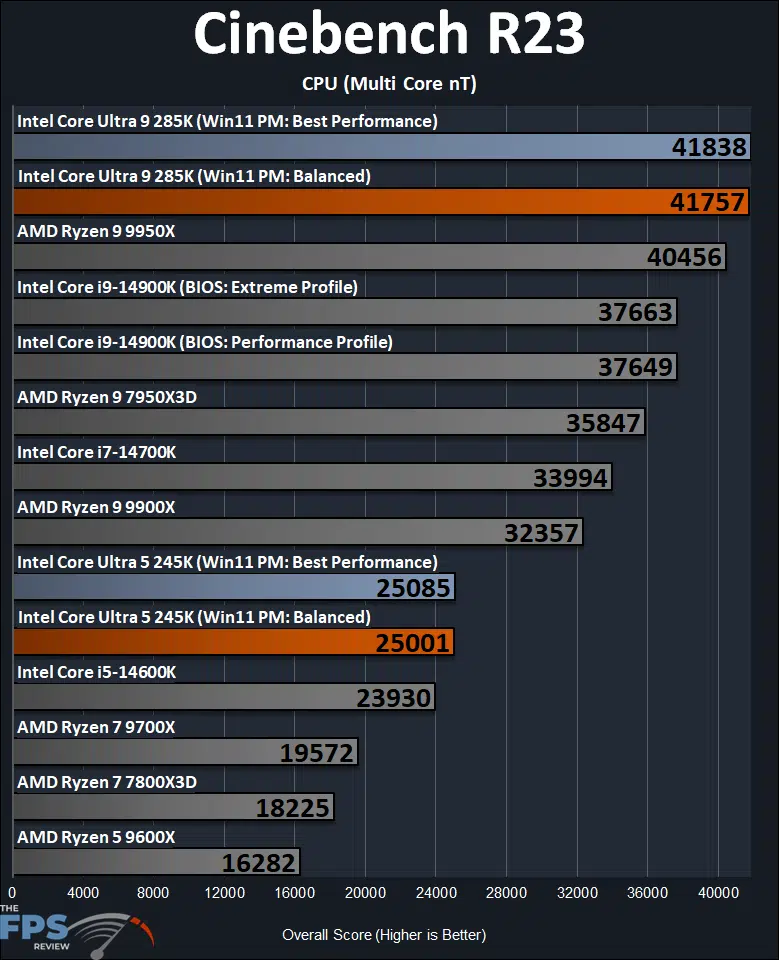Rendering Performance
Cinebench R23
We are using Cinebench R23 to look at multi-core and single-core performance, which is shown in separate graphs below. In the graphs “Win11: PM” stands for Windows 11 Power Mode.
Therefore, we see here that the Intel Core Ultra 9 285K is 10-11% faster than the previous generation Intel Core i9-14900K, which is the best gains we’ve seen so far. The Intel Core Ultra 9 285K is just a small 3% faster than the Ryzen 9 9950X, however, so that isn’t very large. The Intel Core Ultra 5 245K is just a small 4% faster than the previous generation Intel Core i5-14600K. However, it is a larger 28% faster than the AMD Ryzen 9700X, which is pretty impressive considering the core count. If we compare the 245K to the Ryzen 5 9600X, the 245K is 54% faster.
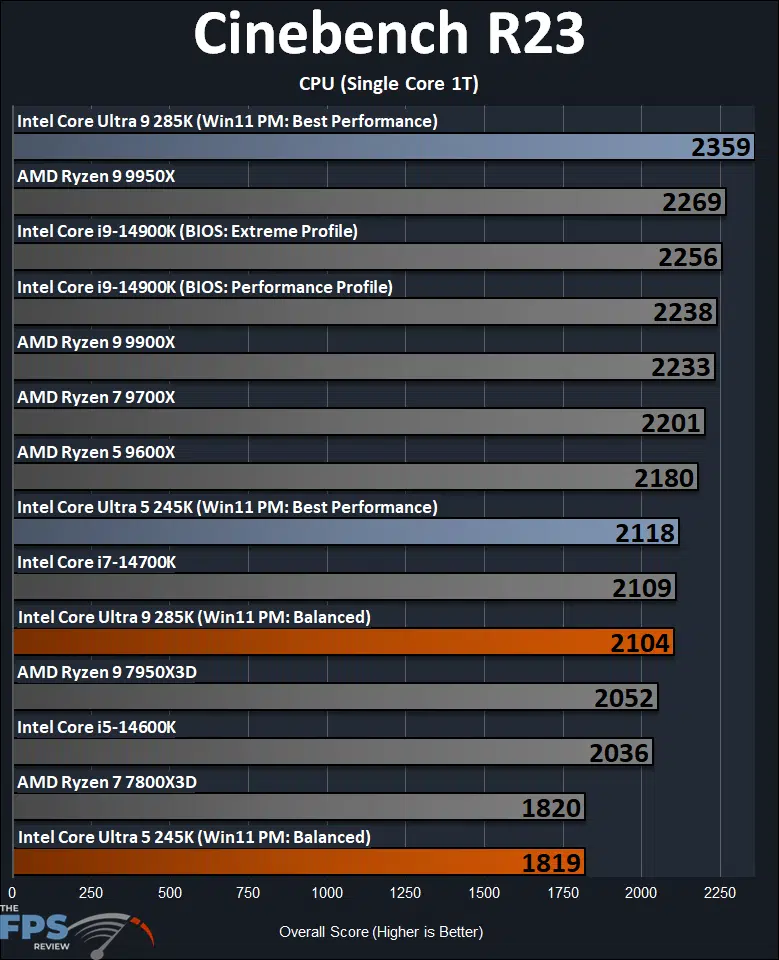
Looking at Cinebench R23 single-core (1T) performance we see once again how devastating the “Balanced” Windows 11 power profile is for the Intel Core Ultra 200S series CPUs in single-core performance. The Intel Core Ultra 9 285K is 11% slower in “Balanced” power profile, and the the 245K is 14% slower. Reminder, that every other comparison CPU on this graph is being run on the “Balanced” power profile setting.
Therefore, if we compare like-for-like at Balanced, the Intel Core Ultra 9 285K is 7% slower than the Intel Core i9-14900K from the previous generation. It is also 7% slower than the Ryzen 9 9950X. The 245K is 17% slower than the 9700X and 9600X.
When we use the “Best Performance” power profile then the 285K is 5% faster than the 14900K and 4% faster than the 9950X, also not a large improvement overall. The 245K in Best Performance is 4% slower than the 9700X and 3% slower than the 9600X.
Blender Open Data Benchmark
We are using the latest Blender Benchmark with Blender 4.2.0 downloaded, results are in samples per minute, with the highest being the best.
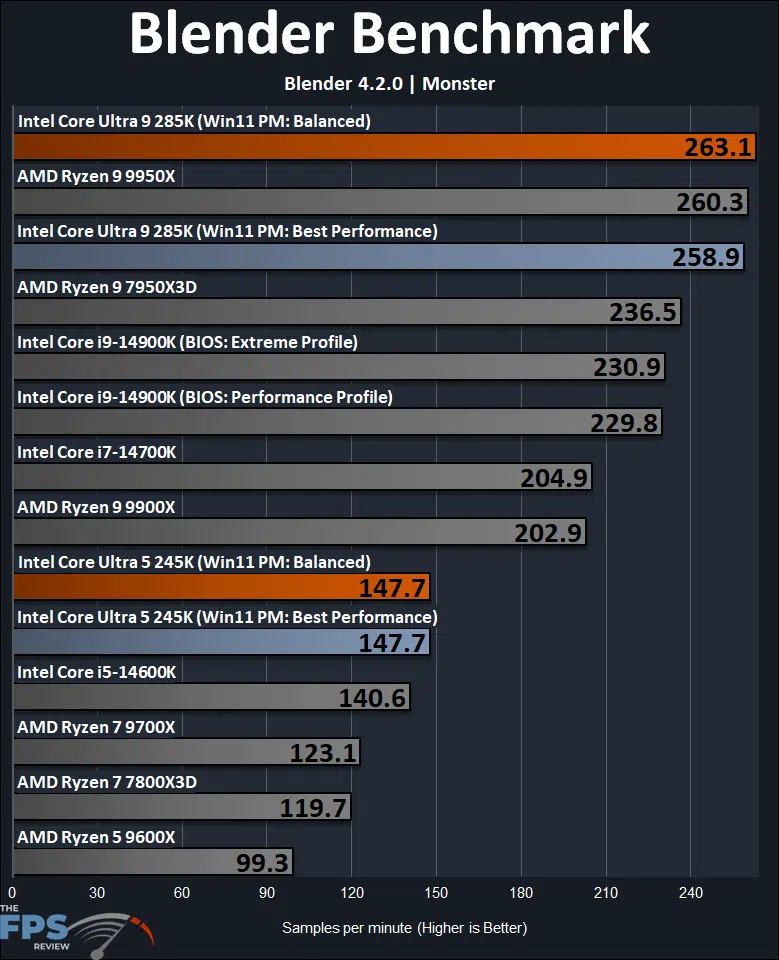
Blender is a good test of multi-core performance, and we see the power profiles play less of a part in performance differences, though there is a 2% difference on the 285K. In Blender the Intel Core Ultra 9 285K in the monster scene is a good bit faster than the 14900K, improving performance by 14%, which is a very good uplift generationally speaking. However, the Intel Core Ultra 9 285K is just on par, or parity, with the AMD Ryzen 9 9950X.
The Intel Core Ultra 5 245K is only 5% faster than the Intel Core i5-14600K, however, which is a very small generational uplift. The Core Ultra 5 245K is therefore 20% faster than the 9700X and 49% faster than the 9600X, which is a very good uplift compared to the competition.
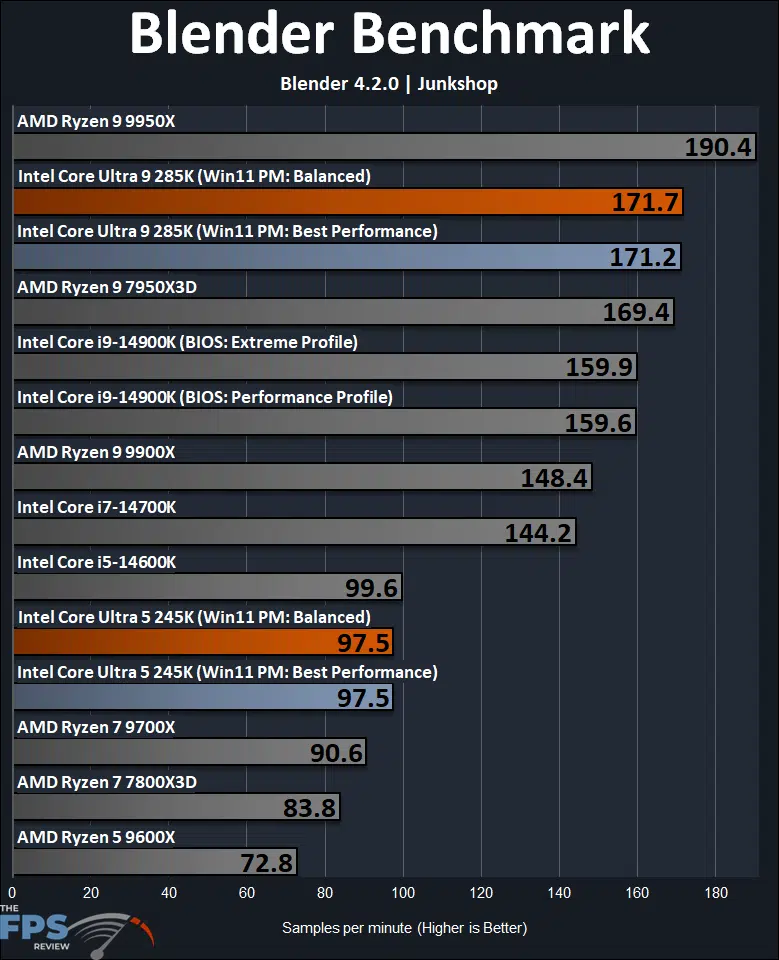
In the Junkshop scene, we see the AMD Ryzen 9950X take a commanding lead in this one. The Intel Core Ultra 9 285K is 10% slower than the Ryzen 9 9950X. The 285K ends up being 7% faster than the 14900K, down from the Monster scene in the graph above. The Intel Core Ultra 5 245K is 2% slower than the previous generation Intel Core i5-14600K, however. The 245K is 8% faster than the 9700X and 34% faster than the 9600X.
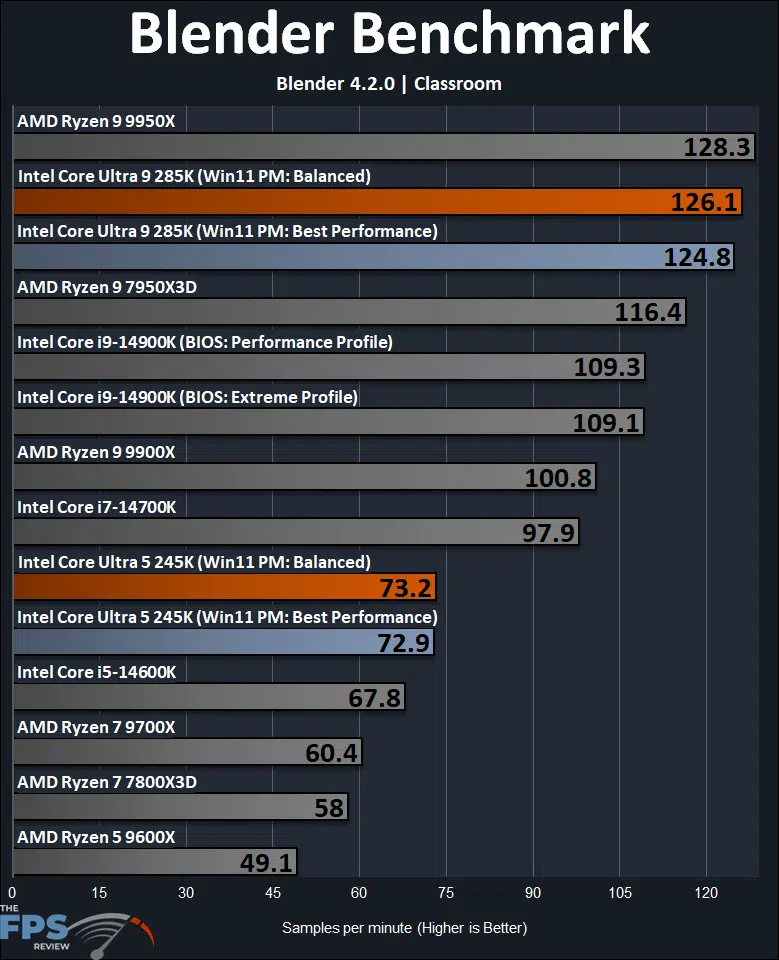
In the Classroom scene, we once again see the AMD Ryzen 9 9950X on top in performance. The Intel Core Ultra 9 285K is 2% slower than the 9950X. The 285K is however 15% faster than the previous generation Intel Core i9-14900K, which is a great uplift for a generation. The Intel Core Ultra 5 245K is also faster than the 14600K by 8% and faster than the 9700X by 20% and faster than the 9600X by 49%.
V-Ray 6 Benchmark
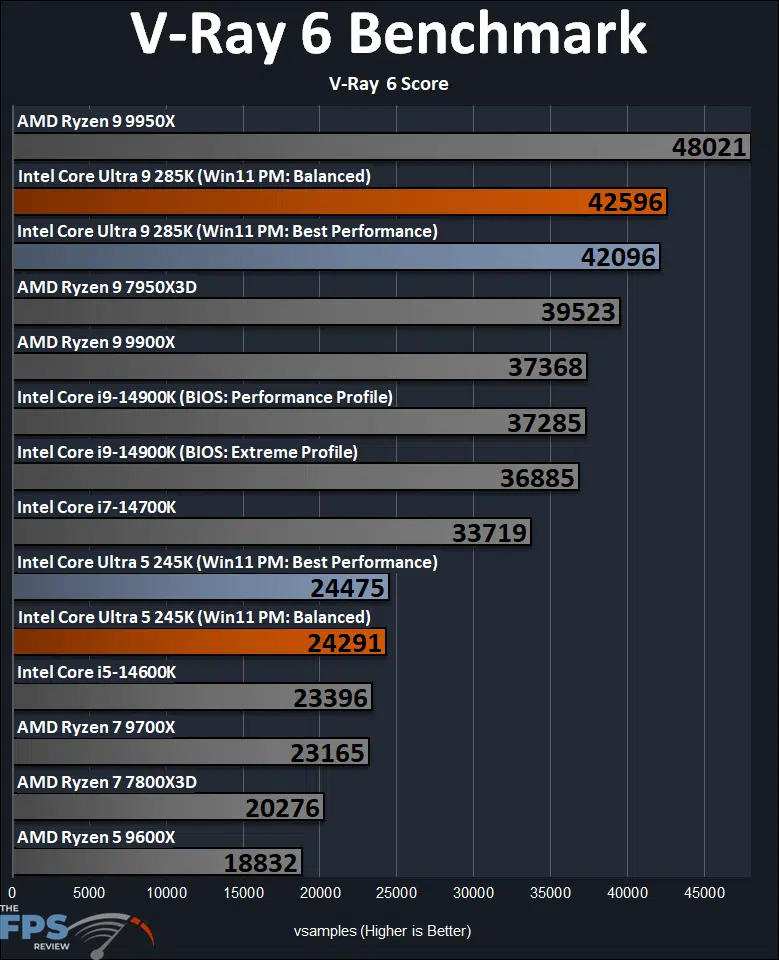
The new AMD Ryzen 9 9950X does exceptionally well in V-RAY 6, and ends up being 13% faster than the Intel Core Ultra 9 285K. This means the 285K is 11% slower than the 9950X. However, the 285K is much faster than the 14900K, improving performance by 14% which is a very decent generational uplift in performance. The Intel Core Ultra 5 245K is very close to 14600K performance though, at just 5% faster. The 245K is 6% faster than the 9700X and 30% faster than the 9600X.
HandBrake
In HandBrake, we transcode a 10-minute video file to the Creator 2160p60 4K H.264 profile preset, rendering on the CPU only. The time in minutes is reported, and lower is better.
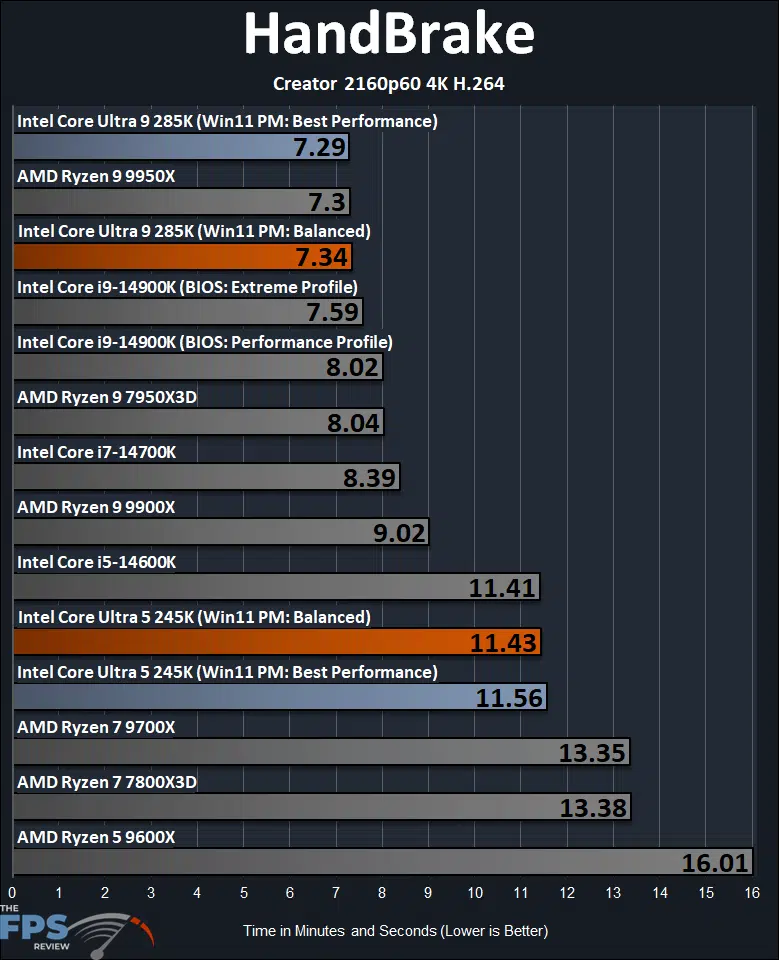
In HandBrake we are directly transcoding a video on the CPU (no iGPU or GPU help). Clearly, the Intel Core Ultra 9 285K and AMD Ryzen 9 9950X are on equal footing here, producing similar render times. This is an improvement over the Intel Core i9-14900K by about 4%, which overall is fairly small, but an improvement nonetheless. The Intel Core Ultra 5 245K is another story, it actually did perform a little slower than the Intel Core i5-14600K, a 1-2% difference, but it was just that bit slower than the previous generation. It did however allow a faster render time compared to the AMD Ryzen 7 9700X and Ryzen 5 9600X by a great, noticeable, amount (14% compared to the 9700X and 29% compared to the 9600X).

